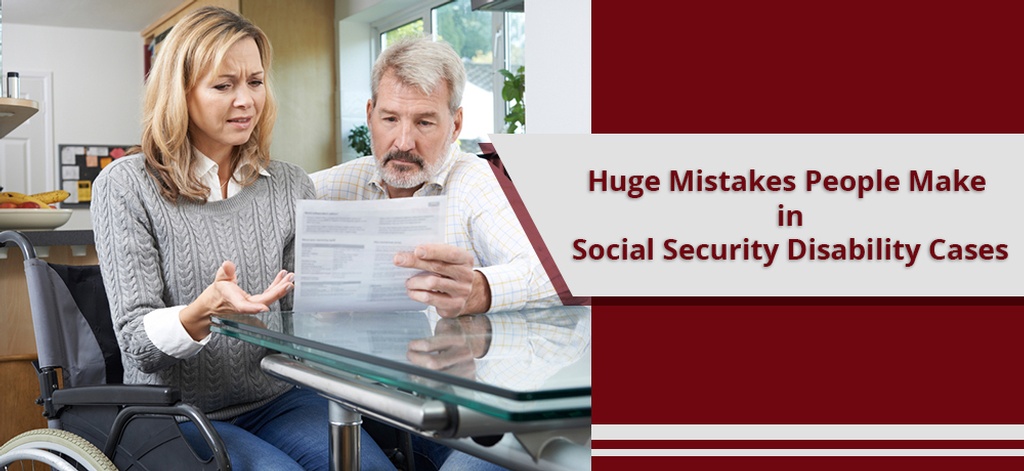
Have you ever got in trouble or hurt because of the absentmindedness or negligence of someone else? It can be devastating especially if the damage caused has repercussions on your work or family life. Instead of trying to resolve such situations yourself, firms are willing to help you get the justice you deserve.
If you’re reaching out to an injury law firm, ensure that the firm has some experience in the field and know what they are dealing with. Although you are not in the wrong, by working with experienced professionals, you will be better equipped to fight a case. You will also be prepped before the case to say precisely what you are supposed to because getting carried away and giving away too much information doesn’t always work in your favor.
To help you avoid many of the fundamental errors people make that prevent them from getting justice, Phillips and McCrea, PLLC, has put together a list of the most common mistakes people make in Social Security Disability cases.
1. Pro Se representation.
Beginning any process uneducated or uninformed is bad news. Some people believe it’s just a matter of filling out a few forms, sending them in, and waiting for a cheque. They are later surprised to find out just how complicated the Social Security Disability (SSDI) process really is. No matter how solid you think your claim may be, there’s no such thing as a “slam dunk” case. Navigating the law can be tricky, and continually telling the judge that you deserve Social Security Disability benefits doesn’t mean you will get them. Even if you provide stacks of medical records proving your disability claim but don’t know how the law applies to your case, you might not win the appeal. That’s where a Social Security Disability attorney comes in. I am an experienced disability attorney and can help prepare and professionally present your case.
2. Missing filing deadlines.
If you have already applied for Social Security Disability benefits and have been denied, you most likely received a letter notifying you about this. Make sure you meet all deadlines for filing your request for reconsideration or a hearing. The Social Security Administration (SSA) usually gives you sixty days to file from the time you receive a denial notice. If you missed a deadline, you will have to show “good cause” for why it was missed. If the SSA decides there wasn’t “good cause” you will have to start the process all over again.
3. Incomplete medical history.
I represent clients that included medical sources for specialists (such as orthopedists, gastroenterologists, rheumatologists) but did not include information for their primary care provider or the emergency room that they went to when initially injured. We do all that we can to fix this at the office but need the client’s input and cooperation.
A medical disability is proven by medical documentation. It is just as important to list the information for the emergency room visit you had when you were initially injured, as it is to list the orthopedic surgeon who performed your surgery. In the same aspect, it is equally important to list your primary care provider, to whom you may have reported symptoms of back pain before receiving any specialized treatment. The medical providers who treated you should give the medical records to you upon your request, but you may have to sign a release.
It is obvious to list the most disabling of your conditions, severe back pain, PTSD, fibromyalgia, cancer, arthritis, schizophrenia, etc., however, I find it to be equally important to list all of the conditions you suffer from. Often, before being represented by me, clients do not list things like asthma, high blood pressure, obesity, and depression, which should be included, along with medical records concerning these conditions, which need to be provided to the Social Security Administration (SSA).
4. Not understanding when you became disabled.
Once you, through consultation with your doctor(s), have determined that you may be unable to work for a period of twelve months or more, you should file for benefits immediately. You could risk losing benefits to which you are legally entitled by waiting longer than necessary to apply.
If you are eligible to receive Disability Insurance Benefits, you can only recover retroactive benefits for the twelve month period prior to submitting your application. Therefore, if you wait more than a year from the date you stop working to apply for benefits, you risk losing more benefits with each month that passes.
Depending on how much you have paid into Social Security over the years, this could result in a loss of thousands of dollars per month.
5. Not having worked long enough to qualify.
You have to work a minimum amount of time to qualify for Social Security Disability benefits. The SSA calculates your credits based on your age, the number of years you’ve worked (and therefore paid into the SS system), and when you became disabled.
6. Temporary disability.
The Social Security Administration requires that your disability is expected to last twelve months or more and or result in death. Before you receive disability benefits, show that you have been disabled for at least an entire year. Additionally, you need to prove that you have not been able to obtain sufficient employment during that time because of your disability.
To avoid these and other mistakes, reach out to the experts at Phillips and McCrea, PLLC. We are an injury and family law firm located in Charlotte, North Carolina, and we pledge diligence, excellence, and integrity in all matters that we handle. Our primary practice areas are social security disability, personal injury, workers’ compensation, and family law. We believe in fostering relationships and work closely with our clients and friends.
For a complete list of services, please click here. If you have any questions about injury and family law, we’d love to hear from you. Please contact us here.
